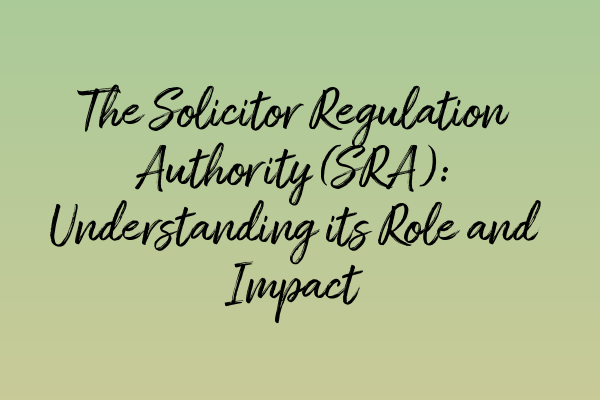The Solicitor Regulation Authority (SRA): Understanding its Role and Impact
Aspiring solicitors and legal professionals in the UK are familiar with the Solicitor Regulation Authority (SRA) and its crucial role in maintaining standards, regulating solicitors, and protecting the public interest. The SRA is the independent regulatory body that ensures the effective regulation of solicitors and law firms in England and Wales. In this blog post, we will delve into the role and impact of the SRA, highlighting its significant contributions to the legal profession.
Key Responsibilities of the SRA
The primary responsibility of the SRA is to maintain public trust and confidence in the solicitors’ profession. It achieves this by setting and enforcing high standards of conduct and professional ethics among solicitors, firms, and other authorized individuals. The SRA promotes the public interest by ensuring that solicitors and law firms operate in a manner that upholds the rule of law and meets the expectations of clients and the wider public.
One of the key areas where the SRA has a significant impact is through its comprehensive framework for solicitor education and training. This framework encompasses key stages of a solicitor’s career, from the Academic Stage to the Vocational Stage and the Professional Stage. By setting rigorous standards and ensuring that aspiring solicitors meet these standards, the SRA ensures that the legal profession is filled with competent and capable individuals.
The SRA also plays a vital role in overseeing the admission of solicitors to the roll, which is the official list of practicing solicitors in England and Wales. This process involves assessing applicants’ character and suitability to become solicitors, including their legal knowledge, skills, and understanding of legal ethics. By maintaining high entry standards, the SRA ensures that only individuals who meet these requirements can practice as solicitors, thus upholding the reputation and integrity of the profession.
In addition to its regulatory functions, the SRA also handles complaints and disciplinary proceedings against solicitors and law firms. This means that if a solicitor or law firm fails to meet the expected standards of professional conduct or breaches any regulatory requirements, the SRA has the power to investigate and take appropriate action. This could result in disciplinary measures, including fines, sanctions, or even removal from the roll.
Impact of the SRA on the Legal Profession
The SRA’s work has a profound impact on the legal profession, shaping the future of solicitors and law firms. By enforcing high standards and providing a robust framework for education and training, the SRA ensures that solicitors possess the knowledge, skills, and ethical values necessary to serve their clients effectively. This enhances the overall quality of legal services and contributes to the trust and confidence that the public places in the profession.
Furthermore, the SRA’s regulation of solicitors and law firms ensures a level playing field, promoting fair competition among legal practitioners. By requiring compliance with regulatory requirements, such as insurance, accounts rules, and continuing professional development, the SRA safeguards the interests of clients and helps maintain the reputation of the profession. This also ensures that clients receive high-quality legal advice and representation, irrespective of the size or location of the law firm.
It’s also worth noting that the SRA’s focus on promoting diversity and inclusion within the legal profession has a transformative impact. By encouraging equality and diversity, the SRA ensures that the best legal talent is recruited and retained, irrespective of background or personal characteristics. This not only serves to enhance social mobility but also contributes to a more diverse and inclusive legal profession, ultimately benefiting the clients and society as a whole.
Conclusion
The Solicitor Regulation Authority (SRA) is an integral part of the legal landscape in England and Wales. Through its role as a regulator, the SRA plays a vital role in maintaining standards, regulating solicitors and law firms, and protecting the interests of the public. By setting high standards, enforcing compliance, and promoting diversity, the SRA ensures that the legal profession operates with integrity and continues to serve the needs of clients and society. To learn more about the legal profession and related topics, be sure to check out our other articles:
– A Closer Look at the Bar Professional Training Course (BPTC)
– The Role of Technology in Modern Legal Practice
– Financing Your Law Degree: Understanding Costs and Options
– A Look into Prominent Law Firms in the UK
– Staying Ahead: Current Legal Industry Trends in the UK
By exploring these topics, you can gain a comprehensive understanding of the legal profession and stay informed about the latest developments and trends.


Leave a Reply